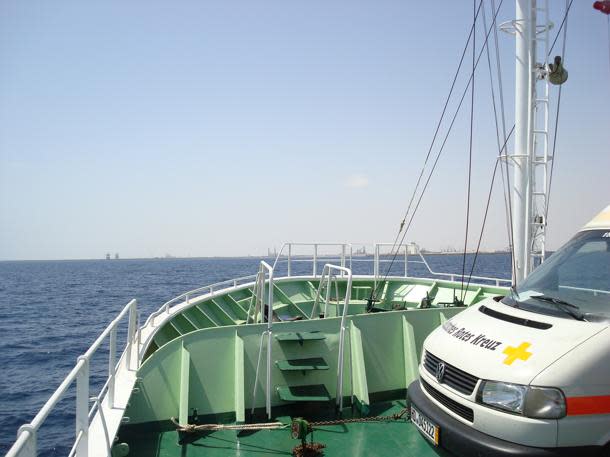 The Envoy
The EnvoyHow the Libyan rebels bought a miniature drone on the Internet
Although Libyan rebels have been celebrating their advance this week into the capital of Tripoli, just a few weeks ago, they had a problem. Outgunned and poorly trained, Libya's ragtag opposition forces were the object of pitying--if not unsympathetic--reports by the journalists covering their seemingly hapless efforts to advance and hold ground against Gadhafi's professional forces, who were better trained and better equipped.
Naturally, the rebels turned to the Internet for help. In June, members of the Libyan National Transition Council were "searching the Web," the New York Times reports, where they found information about a surveillance drone--"essentially a tiny, four-rotor helicopter dangling a pod carrying stabilized-image day- and night-vision cameras"--made by Aeryon Labs of Waterloo, Ontario.

That's how Charles Barlow, a former Canadian army officer who previously served with the United Nations in Syria, found himself on a boat to Misrata, Libya, in July, delivering a miniature surveillance drone to the rebels. (Barlow's photo of pulling into the port of Misrata on July 16 is posted to the right.)
"What was happening with [the Libyan rebels] was they'd be driving down roads, getting shot at and losing people along the way," said Barlow, now the president of Zariba Security, an Ottawa, Canada-based company that works closely with the drone's manufacturer, Aeryon Labs. Barlow spoke with The Envoy on Thursday. "They wanted to see, where are Gadhafi's forces so they did not end up driving right into them."
The rebels first tried a number of different methods to acquire better visibility of the battlefield. "They asked NATO for imaging. NATO could not provide that, it was deemed too sensitive," Barlow said. They then rigged up a toy helicopter and strapped a camera under it, but that didn't work.
"So they started to look around for drones--little ones--they could pilot themselves."
Unlike the Predator drones the United States flies over Afghanistan, Pakistan, Yemen, and elsewhere, which are equipped with sophisticated weapons systems that can strike suspected terrorist hideouts, the Scout miniature unmanned aerial drone has no weapons system. It also does not require an airfield to take off; it can be launched from, say, the top of a car. It is basically a flying, pilotless camera. It weighs about 3 pounds. It can also only fly about 2 miles.
The cost? About $100,000 to $200,000, Barlow said, "but it depends a lot" on the situation, he added, explaining that mitigating factors include how quickly the customer needs the device, how many they're buying, and whether it's a drone that has thermal cameras, which are able to see at night.
(Asked if it costs extra if he is required to deliver the drone to a war zone, Barlow said it does.) A number of bureaucratic obstacles also had to be overcome for the deal to be approved. The Canadian firms needed to get an export license from the Canadian government. The Canadian Foreign Ministry had to determine whether the equipment could be legally provided to Libya's opposition coalition, the National Transitional Council (NTC).
"It all started with the official rep of the NTC to Canada," inquiring about purchasing the drone, Barlow told The Envoy. "And we checked out with [the Canadian Ministry of] Foreign Affairs whether this was a real person. We established these are really NTC guys."
Once Canada recognized the rebels as the official Libyan government, no more legal obstacles remained, Barlow said.
So in July, Barlow embarked on an "18-hour voyage from Malta to the Libyan port of Misrata on a former South Korean fishing ship chartered by the rebels," as the New York Times reported.
Barlow spent two days in the besieged city teaching a team of Libyan rebels how to use the drone.
Asked his observations of Libya's freedom fighters, Barlow said of the dozen he met and trained, none of them were soldiers, but they told him they had no choice but to fight. One, for instance, was until recently a medical technician, whose hospital had been destroyed when Gadhafi's forces attacked the city. He didn't have a job anymore. "So he picked up a gun and went off to fight," Barlow said. "He knew if the Gadhafi guys came back to the city they would burn it down."
"The guys I met were fighting because they had absolutely had no choice," Barlow told The Envoy. "They are not out there fighting for some particular guy ... The guys I met fighting at the front were mortified that they were fighting other Libyans at all."
Will the Libyan opposition be placing more orders for drones? "Now that the rebels have basically won," Barlow said, "they've got more important priorities: like rebuilding hospitals."
(Video at top of an Aeryon Scout unmanned aerial drone, courtesy of Aeryon Labs.)
